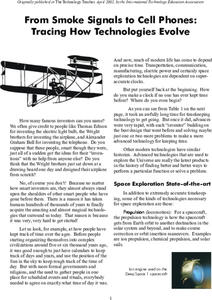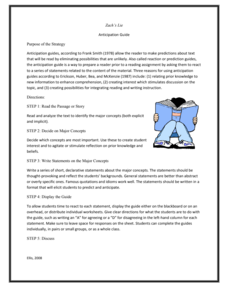BioEd Online
Muscle Fibers
What better way to learn about muscle than by dissecting one? Using cow muscle (beef), learners compare bundles of yarn to muscle fibers as they explore each. The supplemental reading about astronauts losing muscle mass in space and what...
US Institute of Peace
Maintaining Trusting Relationships
What role does trust play in diffusing a tense situation? Young social scientists explore trust on a personal and global level during a lesson on peace and conflict. After participating in a trust sit, participants work in groups to...
Messenger Education
Cooling with Sunshades
Messenger's sun shade measures 8 ft x 6 ft and will have temperatures reaching 700 degree Fahrenheit on the outside while maintaining a cool 70 degrees underneath. In the third activity of four, groups discuss the basic properties of...
NASA
Collecting Light: Inverse Square Law Demo
Light, distance, and mathematics come together to help scientists plan for space missions. Groups examine the relationship between distance from the sun and light availability in a hands-on exploration activity. They model the inverse...
University of Minnesota
C. elegans and the Search for Extraterrestrial Life
Introduce the topic of astrobiology in a unit that's out of this world. Biology scholars examine the search for extraterrestrial life by culturing roundworms, a species that has been key in helping researchers understand the...
Teach Engineering
Light Up Your Life
How do lighting types affect energy efficiency? Explore different types of lighting and the energy they use. Pupils learn about types of lights and calculate the energy used during a typical school year. They discover that being...
Teacher Printables
My Report Pack for. . .
Here is a handy guide for putting together a research report on birds, or on a selection of other topics (see the added materials.). Individuals are guided to think of three questions about their topic, they narrow down subtopics, use a...
NASA
From Smoke Signals to Cell Phones: Tracing How Technologies Evolve
Explore the science of space exploration. Pupils consider technological advances in propulsion, communication, power, navigation, and imaging. They select one of these areas and create a timeline of historical progress that contributed...
PBS
The Planets of the Solar System
Launch a lesson that's sure to capture middle schoolers' interest! Exploration enthusiasts examine the planets of our solar system using an activity from PBS's Space series. The resource includes images and information for each planet,...
NASA
Parachute Design
Bring the science of space exploration to the classroom. Young learners explore the mechanics of the parachute-landing mechanisms on the Mars Rover. They design and build their own parachute models and test their ability to land a probe...
Curated OER
Understanding the Cosmic Microwave Background (CMB)
How did our universe really begin? Explore the Science Big Bang Theory and Cosmic Microwave Background (CMB) with this multiple activity-based instructional activity that demonstrates that the increase of density due to the decrease of...
Vosonos
Interactive Minds: Solar System
Travel through space as you learn about the galaxy, solar system, planets, and much more. An extensive resource for studying astronomy in upper-elementary and middle school classrooms.
School Science
The Big Bang Time Machine
Scholars take off on an interactive spaceship to explore a historical timeline of the big bang theory. They learn about the evolution of mammals and humans, the formation of stars and planets, and the chemical composition of the early...
K5 Learning
The Astronomy Project
A passage about an astronomy lesson may leave readers starstruck. Fifth graders read about a class's exploration into the makeup of the galaxy and its constellations before answering six questions about the terms and vocabulary...
LABScI
Vision Lab: The Eye
Our bodies have some amazing capabilities, but there are some limitations. Explore the limitations of the human eye through the eighth lab activity in a series of 12 biology lessons. Individuals measure their own peripheral vision...
NASA
Build a Satellite
Shake, rattle, and explore space with satellites. Engineers learn how satellites work before designing, building, and testing their own models. Groups engage in quality assurance reviews with colleagues to improve their designs, and the...
Random House
Mapping Skills
Spark interest and enhance your pupils' map skills using Matteo Pericoli's book, See the City: the Journey of Manhattan Unfurled. Through Pericoli's illustrations and text, learners explore the East and West...
Virginia Department of Education
Isotopes
Lead your class through the amazing world of isotopes as they investigate the various properties they contain and further understand their respective location on the periodic table. They explore half-lives and radioactivity as each...
Consortium for Ocean Leadership
Measure for Measure
How does your class measure up? Young scientists create a scale drawing of the JOIDES Resolution in a collaborative activity. The lesson incorporates mathematical principles with deep-sea exploration to focus on enhancing measurement...
Novelinks
Zach’s Lie: Anticipation Guide
The class explores the truths and lies regarding Zach's Lie through a well-written anticipation guide. First in a series of seven resources, the guide addresses themes within the text. The class collaboratively discusses their...
American Statistical Association
A Sweet Task
Candy is always an effective motivator! A fun math activity uses M&M's and Skittles to explore two-way frequency tables and conditional probability. The candy can serve a dual purpose as manipulatives and experimental data.
Michigan State University
In Search of Life
Explore the habitats around you with an activity that takes kids out of the classroom to learn about the local variety of habitats and the living things that call them home. In small groups, scholars investigate their surroundings,...
EngageNY
Using Sample Data to Estimate a Population Characteristic
How many of the pupils at your school think selling soda would be a good idea? Show learners how to develop a study to answer questions like these! The lesson explores the meaning of a population versus a sample and how to interpret the...
Missouri Department of Elementary
What are Comfortable (Good) and Uncomfortable (Bad) Feelings?
Two puppets open a discussion about comfrotable and uncomfortable touches. Scholars add to the discussion information they remember from a previous lesson, then delve deep into three problem-solving safety rules, and explore...























